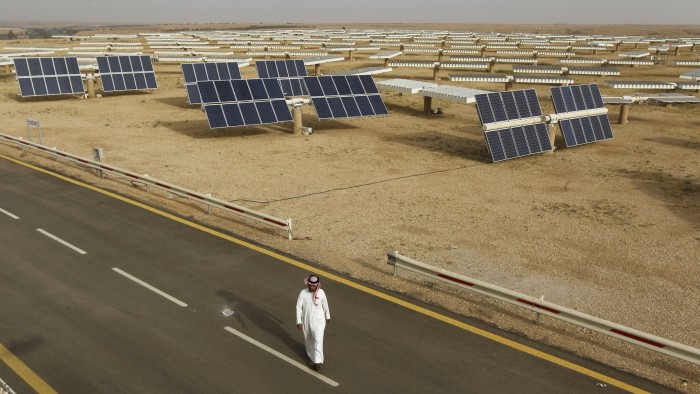Unlock the Editor’s Digest for free
Roula Khalaf, Editor of the FT, selects her favourite stories in this weekly newsletter.
Saudi Arabia’s big businesses are embracing solar power as they seek to save on energy costs after the government eliminated electricity subsidies in the world’s largest oil exporter.
Encouraged by decreasing photovoltaic panel costs and the state’s sustainability targets, several large companies, in sectors ranging from logistics to retail, have installed rooftop solar panels in recent months.
The Saudi government wants half of the kingdom’s power generation to come from renewable sources by 2030 and to achieve net zero by 2060.
But experts say the critical factor driving recent solar take-up may be the phasing out of energy subsidies that began in 2018 as part of wider economic reforms, which included the rollout of large-scale renewable projects.
“We invested in solar and actually it’s paying back,” said Mazen Fakeeh, president of Fakeeh Care Group. “We have managed to reduce our carbon footprint, we have managed to reduce cost, albeit marginally because still solar is not cheap and the capital investment is big.”
The PV panels, installed on the roof of the company’s multistorey car park near a cluster of hospital buildings on Jeddah’s Palestine Street, helped the group save more than SR170,000 ($45,000) on electricity bills in 2024.
“It’s a long-term investment, so to see the full return on investment, you need two or three decades, actually. But we’re encouraged by the initial results,” he said.
Faris al-Sulayman, co-founder of Haala Energy, a local start-up that helps companies build solar power systems, said there was a clear difference in demand between commercial and industrial clients.
“Commercial clients, malls, warehouses et cetera, who pay the highest electricity tariff at SR0.30 per kilowatt-hour, are significantly more receptive to the business case for rooftop solar,” he said. “Industrial clients, who pay a lower tariff of SR0.18, are less responsive.”
Saudi companies that are part of multinational groups such as Ikea and GSK have deployed solar power at the encouragement of their parent companies, which have sustainability goals. Meeting such expectations has also been a factor for other Saudi groups, including logistics and transport businesses, that have links to western markets.
“The primary objective is to contribute to supply chain sustainability in a positive way because, at the end of the day, this is also recognised by our vendors, our suppliers and our partners,” said Amr Elmansoury, chief supply chain officer at Tamer Group, which was founded in 1922.
“We partner with more than 200 suppliers across the globe from different industries, and they also have their own goals when it comes to going green.”
Still, the company saved more than SR440,000 through energy efficiency and reduced utility costs last year after installing rooftop solar panels on its logistics hubs in Jeddah and Riyadh. Its aim is now to extend this to all its major distribution centres within two years, said Elmansoury.
The shift has been helped by the supply of cheaper Chinese-made PV modules. Greenfield foreign direct investment from China into the kingdom from 2021 to October last year totalled $21.6bn. About a third was directed towards clean technologies such as batteries, solar and wind, according to investments tracked by fDi Markets.
But experts said the most important driver may be Crown Prince Mohammed bin Salman’s reforms to cut subsidies and diversify the economy, which drove up diesel prices by 44 per cent last year.
“Although the declining cost of renewable energy has also played a role, the direction of the Saudi government’s fiscal reform — including the energy subsidy changes — has been a highly significant factor in encouraging companies to actively consider power generation options beyond fossil fuels,” said Shigeto Kondo, senior researcher at the Japan-based Institute of Energy Economics.
Read the full article here




